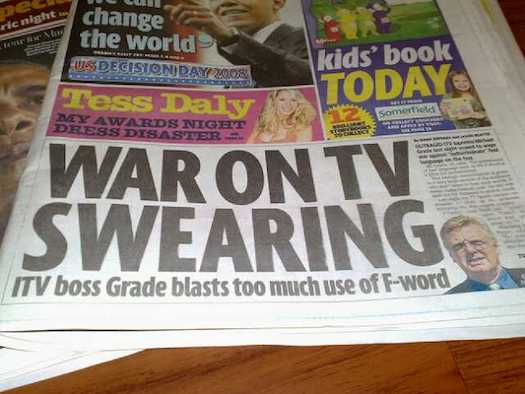Radio Tomorrow with James Cridland
Before we begin – the links in this article lead to words you may find offensive.
Over twenty years ago, I remember listening to the Dutch radio station Sky Radio, and hearing an incomprehensible dutch jingle followed by Prince’s new hit – “Sexy MF”. Except Sky Radio didn’t play the radio-safe version. We got the proper, full, sweary version. I listened, mouth open with horror. Surely not!
The “MF” word is still amongst the most offensive, according to research from the UK’s broadcast regulator Ofcom. They’ve just released a report – which you can read in full – detailing a whole bunch of naughty words and the public’s attitude to them. The research is boyishly amusing, with a long list of really very offensive words being discussed in a very serious way. Last week on Twitter I posted a screengrab of the words they researched, which got much retweeting.
The attitude to fruity language is very different depending on which country you’re in. The Netherlands clearly had no issue with the full version of that Prince song; and the UK typically has a view around context and timing – after 9.00pm on television you can say some quite naughty things, and radio is a little more regulated, particularly when there could reasonably be children listening.
The US rules appear strangely prescriptive, with seven banned words, including one that is pretty mild. It would appear that almost anything else is allowed, if not wholly welcomed.
Australian radio appears to get away with much more than radio in most places. I had a similar open-mouthed experience when I first arrived here, listening to a broadcaster in the middle of the day. A quick jingle saying “Language Warning!” preceded a song where the chorus appeared to have really quite a few F-words. More F-words than other words, I seemed to remember. Australian language is relaxed and informal, and that’s certainly the case on radio.
It’s interesting times for those that watch out for swearing. More and more tracks include fruity language, and stations are often getting into trouble for playing them. Dash Radio, a new service in the US, has just launched a switch that allows you to either hear the clean or explicit version of tracks on its service – a new and novel form of personalisation.
Perhaps the best excuse has been when a radio station in Scotland was hauled in front of the broadcast regulator to explain the offensive language used in their output. I blogged about it at the time, and if you fancy a frankly genius excuse for playing very filthy lyrics, it’s worth a look.
In any case – the UK research says that people do want TV and radio to reflect everyday life, and that radio, as a more intimate medium than TV, probably needs to be a little more careful. It’s also worthwhile saying that while podcasters are proud that their medium is “uncensored”, and there’s nothing to stop them using bad language, few actually swear. There’s little need.
But next time you listen to radio from overseas, don’t be surprised if you hear language that would be astonishing in your home country. Particularly on the internet.
About The Author
 James Cridland is a radio futurologist: a writer, speaker and consultant on the effect that new platforms and technology are having on the radio business across the world.
James Cridland is a radio futurologist: a writer, speaker and consultant on the effect that new platforms and technology are having on the radio business across the world.
He writes for publications across the world, and runs media.info the worldwide media information website. He also runs a free weekly newsletter with news of radio’s future.
British by birth, James lives in Brisbane, QLD and is a fan of craft beer.

